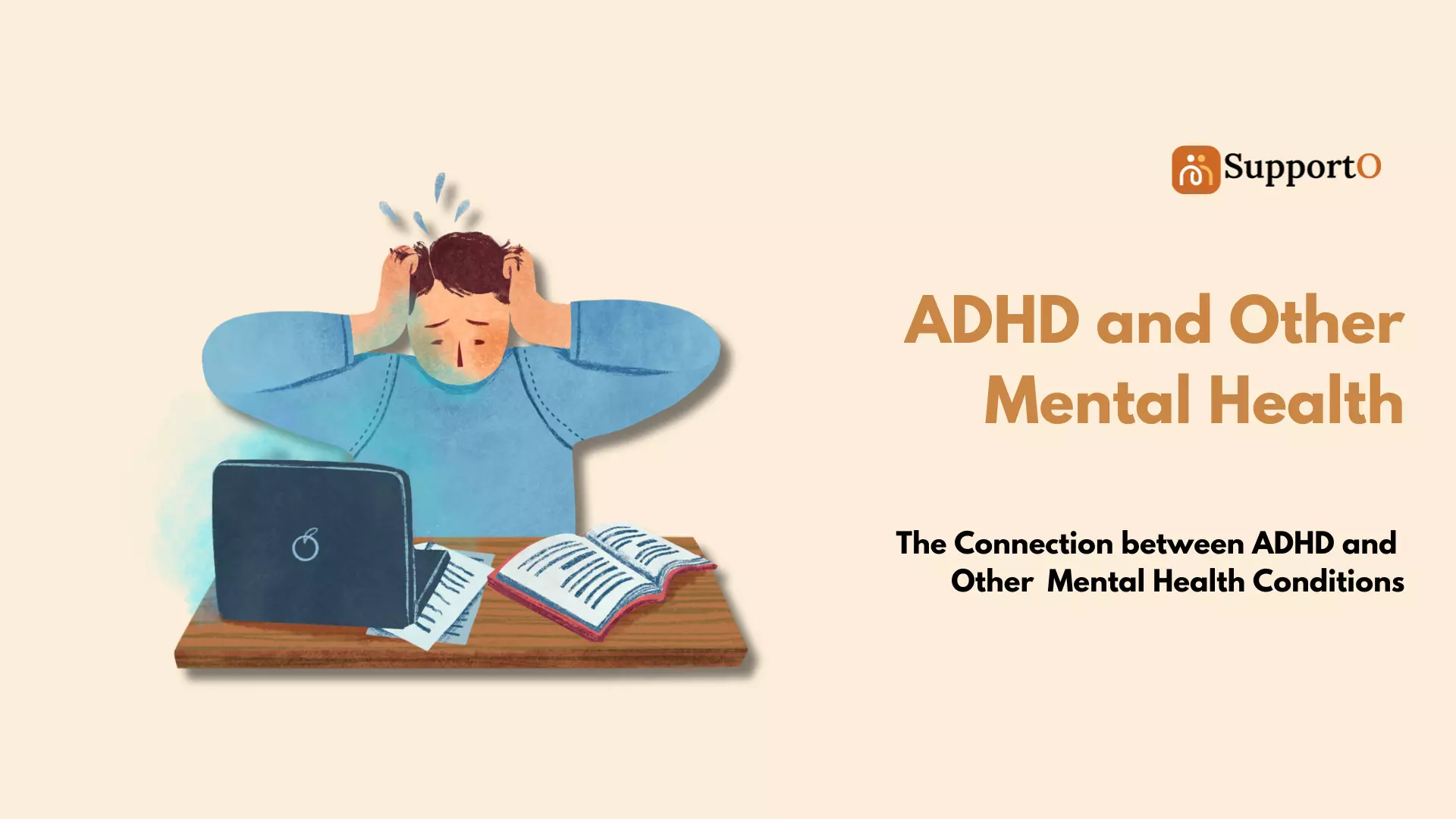The Connection between ADHD and Other Mental Health Conditions
Attention Deficit Hyperactivity Disorder (ADHD) is a neurodevelopmental disorder affecting millions of children and adults around the world. Although ADHDs are often referred to in relation to focus, impulse, and hyperactivity problems, it often is not a standalone condition. Research shows a clear link between ADHD and other mental health issues such as depression, anxiety, and stress-related conditions. The knowledge of these associations can help with early intervention and effective management.
What is ADHD and Its Symptoms
Before figuring out the basic difference between the two, let's take an overview of Attention-Deficit Hyperactivity Disorder (ADHD) and Its Symptoms. Attention Deficit Hyperactivity Disorder (ADHD) is a neuro-developmental disorder characterized by chronic patterns of inattention, hyperactivity, and impulsivity that impair daily functioning. Common symptoms include:
a) Inability to focus for an extended period
b) Frequent forgetfulness and disorganization
c) Hyperactivity, including fidgeting and difficulty waiting for turn
d) Inability to sit still, restlessness, and fidgeting
e) Frustration and emotional dysregulation
These symptoms can range in severity, but they invariably lead to problems in school, work, and home. But ADHD almost never is its own diagnosis. Many individuals with ADHD experience overlapping symptoms that indicate the presence of coexisting mental health conditions.
The Emotional Toll of ADHD and Depression
Affecting people of all ages, ADHD is linked to several common comorbid conditions — one of the most prevalent being depression. Such studies indicate that people with ADHD have a higher risk for depressive episodes, because:
a) Long-term stress resulting from academic or workplace challenges
b) Feelings of low self-esteem because of feelings of failure
c) Mood instability due to emotional dysregulation
Because ADHD makes it challenging to keep up with routines and responsibilities, people with the disorder may feel overwhelmed, which can compound feelings of hopelessness and sadness. ADHD individuals engage in online emotional platforms such as SupportO, where they can share their experiences and access emotional support and mental health resources.
An Overview of ADHD & Anxiety Disorders
Anxiety disorders are a widely involved comorbidity in adult patients with ADHD. The constant demands of deadlines, organization, and socializing can amplify anxiety. Common anxiety disorders that frequently co-occur with ADHD:
a) Recognizing the Symptoms of Generalized Anxiety Disorder (GAD)
b) Social Anxiety Disorder
c) Panic Disorder
People who have ADHD can worry too much, have racing thoughts, and feel restless. These symptoms can disrupt their ability to focus, worsening both ADHD and anxiety symptoms. These challenges can easily spiral out of control, but there are stress management techniques like mindfulness, therapy, and emotional support systems like SupportO that can alleviate these adversities.
Stress and ADHD: A Cycle of Viciousness
People with ADHD are not even in the same ballpark for chronic stress. You may find it hard to manage your time, get things done, and hold on to your relationships—problems that can keep you stressed out. Developing ADHD symptoms can also worsen with the increase of stress, creating a cycle of recurrence. This can manifest as:
a) Growing forgetfulness and disorganization
b) Shouting and frustration
c) Headaches and tiredness are also physical symptoms
Structured strategies, therapy, and emotional online platforms where individuals can get connected to professionals or peers for support and guidance can benefit in breaking this cycle.
ADHD and Emotional Dysregulation: Diagnosis and Treatment
ADHD features a core symptom of emotional dysregulation, which may make a sufferer more likely to develop mood disorders. Lack of emotional regulation can lead to emotional outbursts, increased irritability, and inability to cope with setbacks. Bipolar disorder, for instance, has a number of overlapping symptoms with ADHD, including impulsivity and hyperactivity, but complicating diagnosis and treatment.
Managing ADHD, Depression, Anxiety, And Other Coexisting Conditions
While ADHD and its related conditions can be difficult, there are numerous effective treatment approaches:
a) Professional Therapy & Counseling: Cognitive Behavioral Therapy (CBT) can assist people in creating coping mechanisms for ADHD, anxiety, and depression.
b) Medication Management: If prescribed by a healthcare professional, ADHD medications can work together with antidepressants or anti-anxiety medication to balance symptoms.
c) Time Management & Organization Tools: Digital planners, reminders, and other ADHD-friendly productivity apps to relieve stress and increase efficiency.
d) Mindfulness & Stress Reduction Techniques: Meditation, deep breathing, and journaling can be useful practices to address emotional dysregulation.
e) Support Networks & Emotional Online Platforms: Our Platform, SupportO is one of the platforms where individuals can freely talk about their challenges or seek professional help as well as find peer support.
Conclusion
ADHD isn’t only about hyperactivity and inattention — it can have a major impact on mental health, and often co-occurs with depression, anxiety and chronic stress. Understanding these links can guide people towards the proper interventions, be it therapy, medication, or emotional online resources like SupportO.
Finally, becoming aware of the ripple effects of ADHD can help us to foster a more supportive and understanding environment for those affected.
